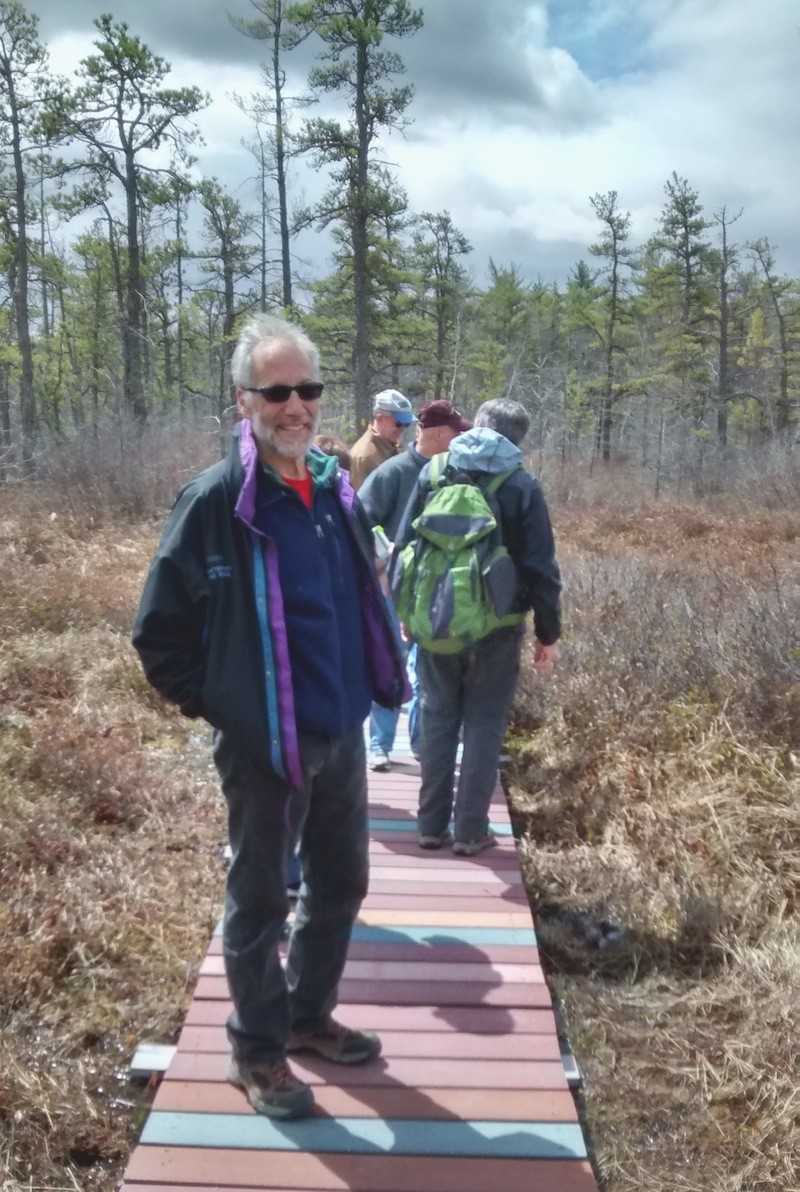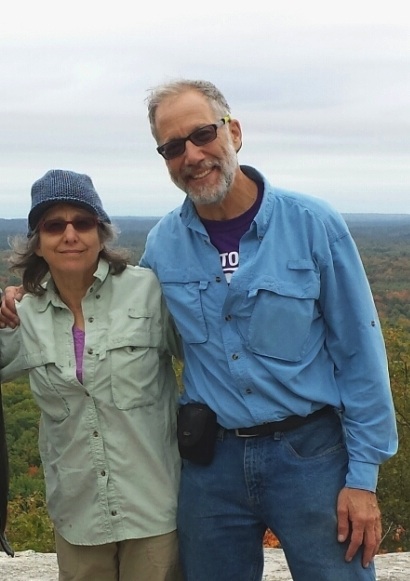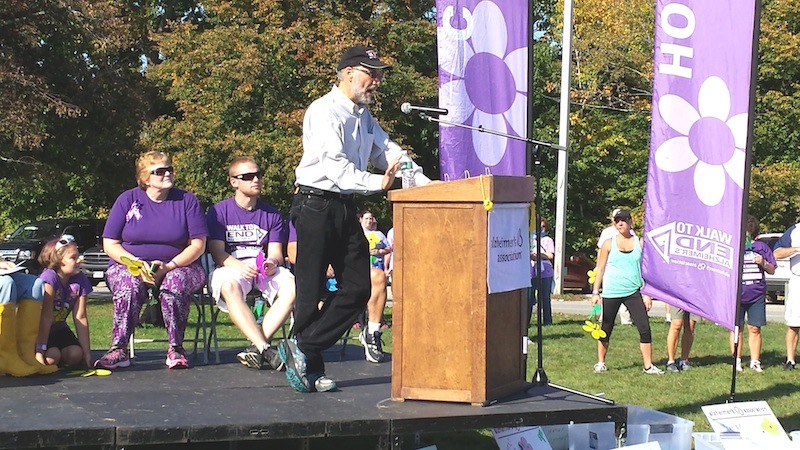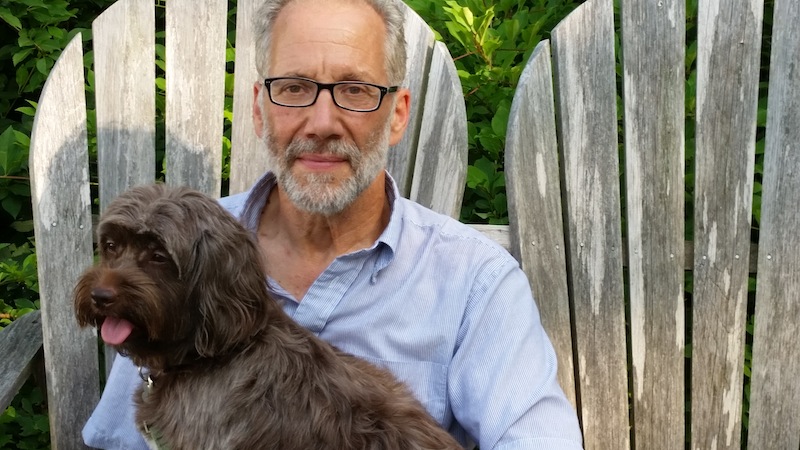After cancer, Alzheimer’s disease is the second most feared disease in America. Right now, about 5.2 million people in this country are living with Alzheimer’s. Each year, the number grows. That’s because baby boomers continue to age and, in general, people are living longer. By 2025 — 10 years from now — it’s estimated that more than 7 million people in the United States will have Alzheimer’s. No wonder we worry.
Although it is not considered a normal part of aging, the risk of Alzheimer’s disease increases with age. When you hit 65 you’ve got a 13 percent chance of developing it and if you’re fortunate enough to reach 85, it’s nearly 50 – 50. Alzheimer’s can also be diagnosed in someone under the age of 65. It’s usually referred to as early-onset Alzheimer’s.
Dan Wartenberg, who lives on Peaks Island with his wife Caron Chess, has early-onset Alzheimer’s. He was diagnosed four years ago at the age of 61. Dan has a Ph.D. in ecology and evolution and at the time of his diagnosis, was a professor and Division Chief at the Environmental and Occupational Health Sciences Institute at Rutgers. He taught medical students about public health issues. He was well regarded internationally for his work on environmental risk, pollution and public health. Among many other accomplishments, his resume includes a long list of scientific publications and presentations. You’ll find his name in Marquis’ Who’s Who in Science and Engineering.
The defining moment in the new chapter of his life was when a student asked him a question in class and his mind went blank. “It felt horrible,” says Dan. “I just didn’t know the answer. It shocked me. I’d never had that happen while I was teaching. I said that’s it. If I can’t answer a student’s question I can’t teach.”
Early testing showed that Dan had mild cognitive impairment. Caron had been noticing some worrisome signs. “But getting the diagnosis was scary,” she says. “I didn’t think he was that bad.”
Living a meaningful life
While people with Alzheimer’s often progress at different rates, the hard truth is that the disease always progresses, always gets worse. We often don’t hear about early Alzheimer’s because the symptoms can be so subtle they go unnoticed. As the memory deteriorates and other symptoms arise, many people become more and more isolated.
As his disease has progressed, Dan has had to give up huge chunks of his former life. Teaching, for instance, and helping poor communities struggling with toxic exposures. He was also a volunteer firefighter.
“It’s hard for me because I can’t do it, but I can’t,” says Dan. “I recognize that.”
Does he ever get angry? “Some things I surely get angry about, yes,” he answers. “I get frustrated. There are things I’d still like to do. Like the work I was doing. I loved it.”
Dan decided early on that he would not “just sit around being miserable.” Instead, he would try to be as active as he could for as long as he could.
He and Caron have long-time connections to Maine and now make their home on Peaks Island instead of New Jersey. One of the first things they did was contact the Maine chapter of the Alzheimer’s Association, which led them to Mark Pechenik. Mark is director of community engagement and outreach. He also runs the chapter’s Early Stage Social Engagement Program.
The early stage group has been a lifesaver. “We’ve gone on nature walks to places I had never heard of,” he says. “I have tried things like a drum circle and candlepin bowling. And Mark takes us to all kinds of weird museums.”
Mark sees Dan and other members of the group as heroes. “They are the ones who say I have this diagnosis, but I am going to make the most of the time I have available,” he explains. “My mission is to help them spend their time in a quality way. We focus on preventing a very damaging aspect of this disease and that’s isolation. It’s common for people with this diagnosis to feel they are alone and that no one understands what they’re going through. We provide them with the opportunity to enjoy life and what’s around them and to do so with people who know what they’re going through. It’s a window of opportunity when they don’t have to be concerned about what they can’t do”
And for Caron and the other care partners who also participate in the program, it’s a respite from all the responsibilities they must now carry.
“It’s a huge challenge,” says Caron. “I have trouble keeping my head above water sometimes. I have to do everything. Dan and I used to solve problems better together than individually because we had different perspectives. We noodled through with problem solving and now I have to do it.”
And now, although Dan is able to participate in a conversation, it’s likely he won’t remember it. And he may not appear to have any issues at first, but it doesn’t take long to realize something isn’t right. I asked him where he and Caron had been before meeting me for our interview. “Various places,” he answered. “Oh, you mean today? Umm, I don’t remember.”
“We went to the vet,” Caron tells him.
“That’s right,” says Dan, “we took the dog to the vet.”
Another challenge is that Dan used to be self-sufficient. “He spent most of his life on the computer,” says Caron, “and now he can’t do that. I look for things he might enjoy. He doesn’t like to spend time alone.”
Living with Alzheimer’s, caring for someone with Alzheimer’s causes stress. A great deal of stress. Caron and Dan quickly realized they both needed support. “We have a couples therapist,” says Caron. “She helps us discuss tough issues. She would never call herself a specialist, but she obviously has a lot of experience with couples with dementia. We were referred by a neurologist. She’s based in Rhode Island, so we Skype.”
They try not to look into the future, even though it often stares them in the face. “I notice little things on a daily basis that still make me go uh, yeah, ok, this is a new limitation,” says Caron. “We have some help. The Alzheimer’s programs. Dan does yoga here on the Island. He walks our dog. He goes swimming with a friend once a week. We have a support network. We’re fortunate that people look out for us.”
Dan and Caron have been married 27 years. Because of Alzheimer’s, there is a lot of grief in their relationship and a lot of frustration, but there is also a lot of love and caring and determination. Determination to live each moment, to ask for help, and to share their personal stories. “Being a presenter is one of the most important things I do,” says Dan. “I can show it is still possible to live a meaningful life with this disease. “Alzheimer’s is not an end. But the beginning of a very different life.”
Alzheimer’s support
In addition to the Early Stage Social Engagement Program, the Maine Chapter of the Alzheimer’s Association also offers services such as care consultations, education programs, and more than 40 support groups throughout Maine. For more information, contact the Alzheimer’s Association, Maine Chapter at 207-772-0115 or send an email to Peter Baker, Manager of Helpline Services.
Upcoming Alzheimer’s presentation
Peaks Island Health Center
Doug MacVane Community Room
Tuesday, December 8
1 PM to 2:30 PM
Speakers: Mark Pechenik, Alzheimer’s Association, Maine Chapter
Dan Wartenberg, Peaks Islander
Alzheimer’s Disease profoundly affects the lives of those who contend with it. Of the ten leading causes of death in America, Alzheimer’s ranks sixth and is the only one that cannot be slowed, stopped or prevented.
Learn the signs and symptoms of Alzheimer’s Disease and how to distinguish them from the vagaries of normal aging. Meet an island neighbor who is living with early-onset Alzheimer’s and gain valuable insights from his personal perspective.
Take this opportunity to bring your fears about Alzheimer’s into the open and discover how we as a community can support those affected by this illness. Because one way or another, Alzheimer’s will affect us all.
This post originally appeared in the Advantage Home Care blog, which I also write.





Alzheimer’s is horrible I do hope he has been tested for Lyme.